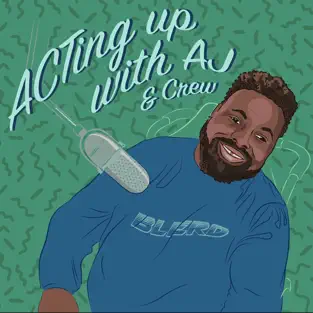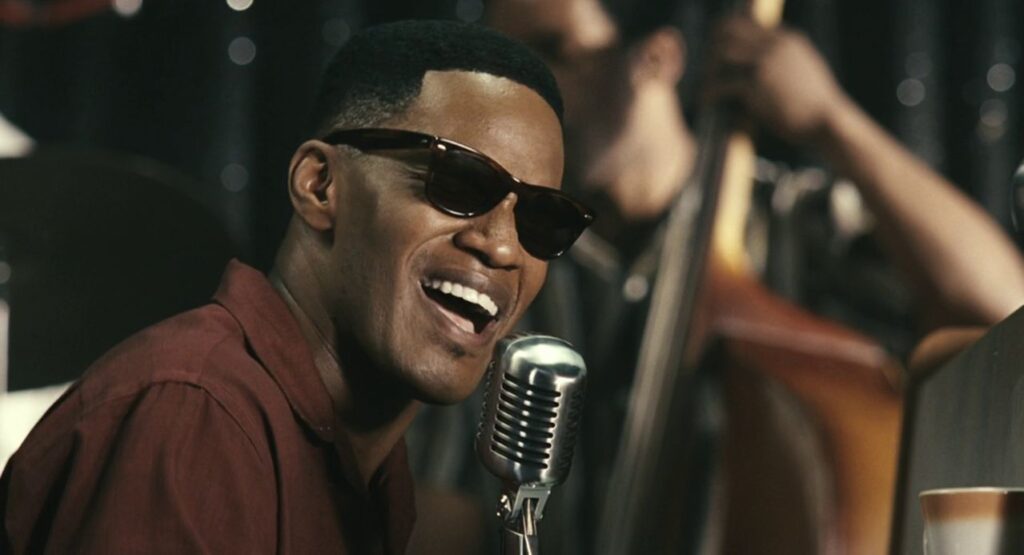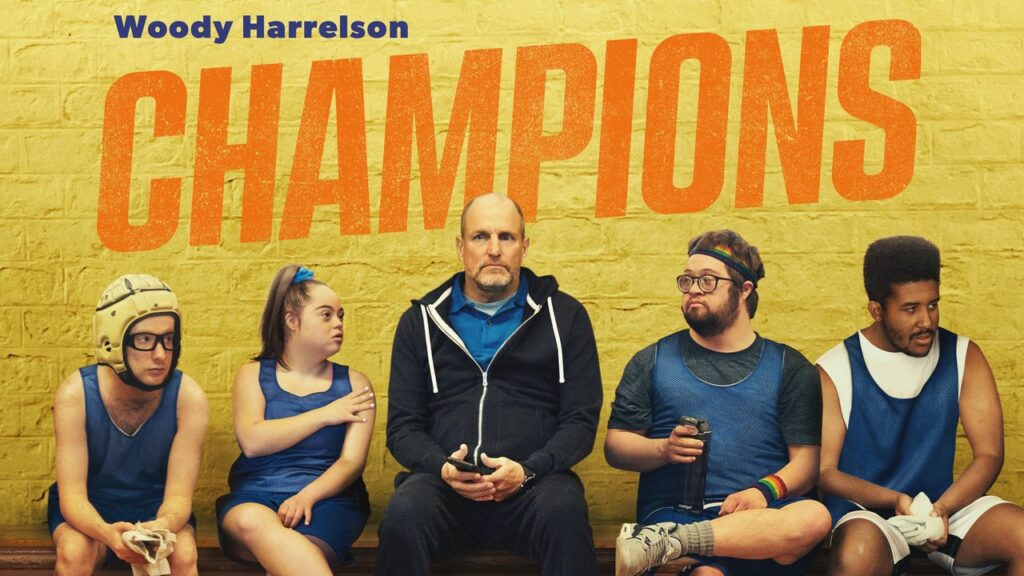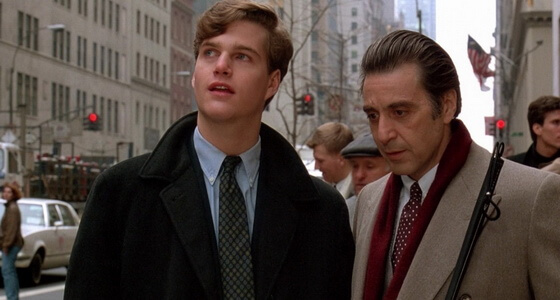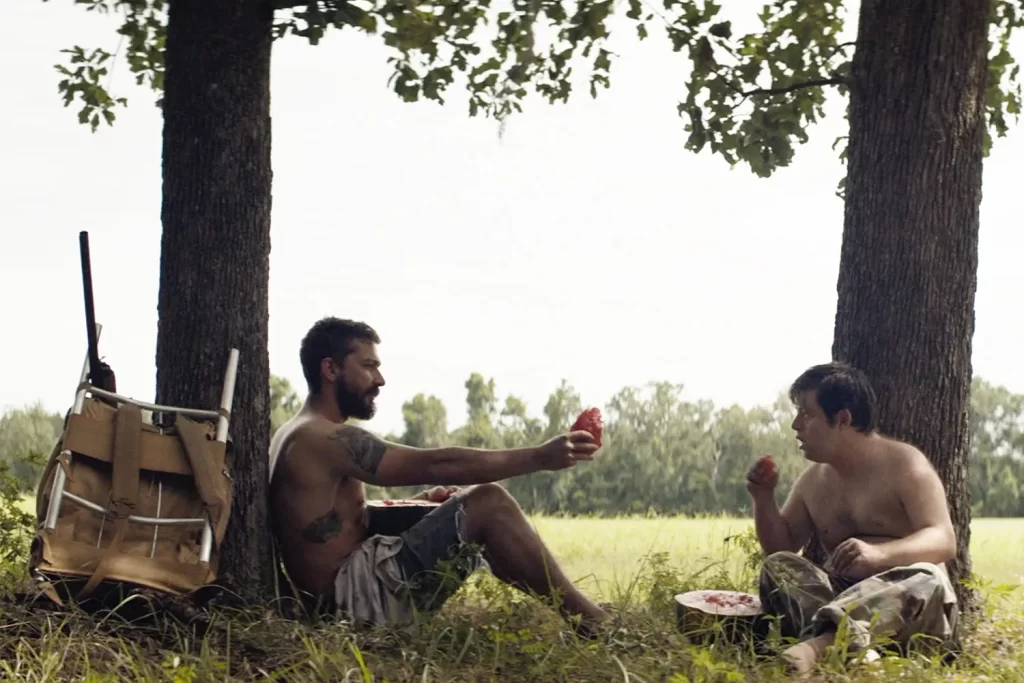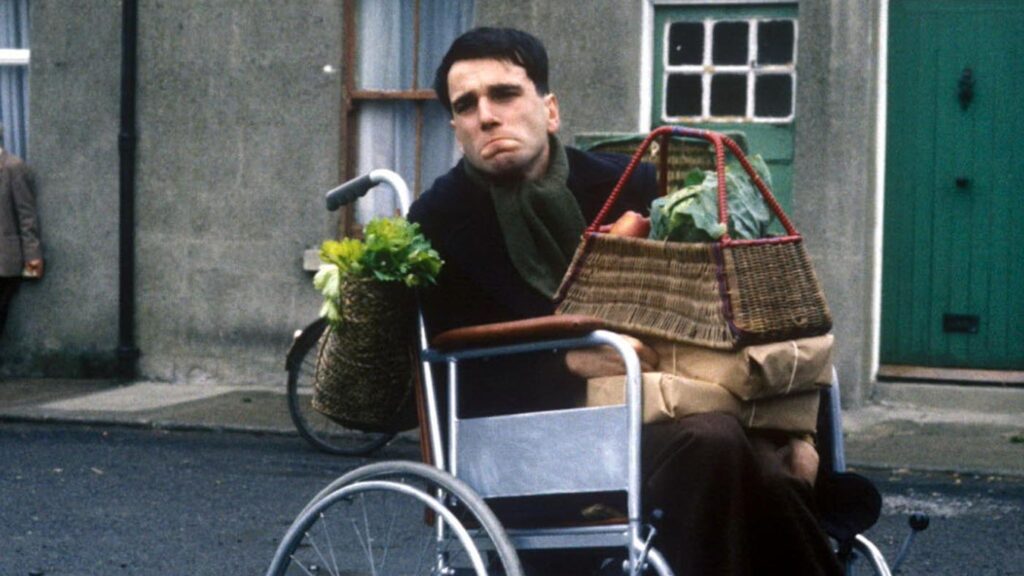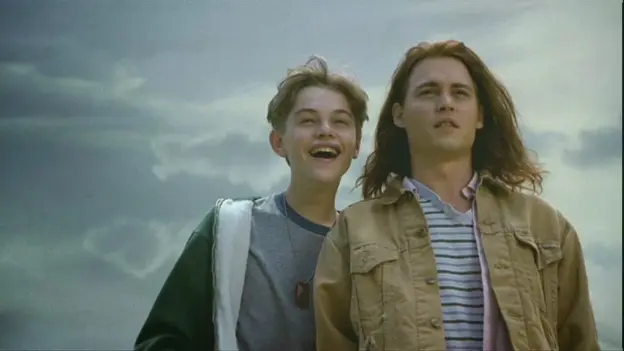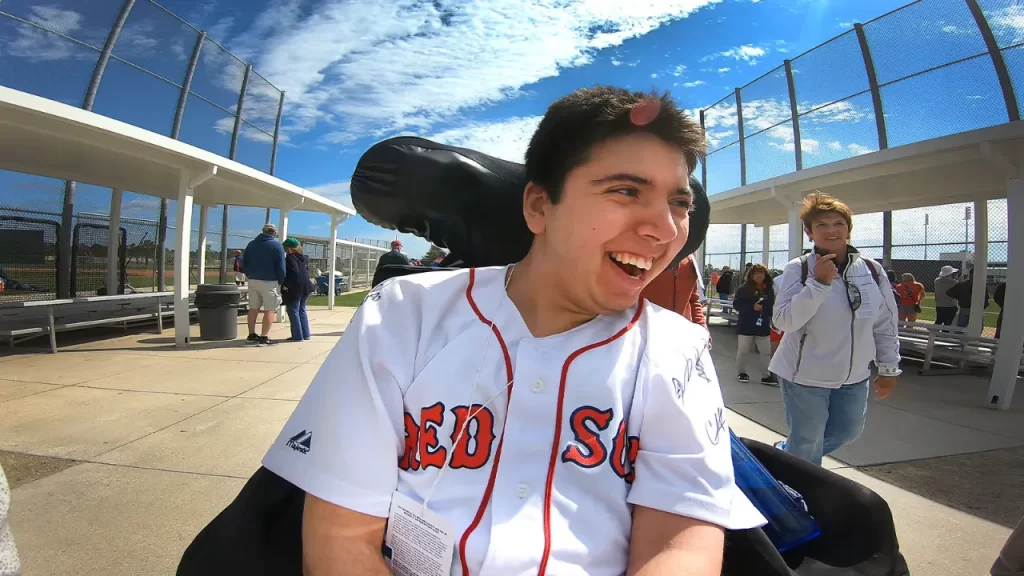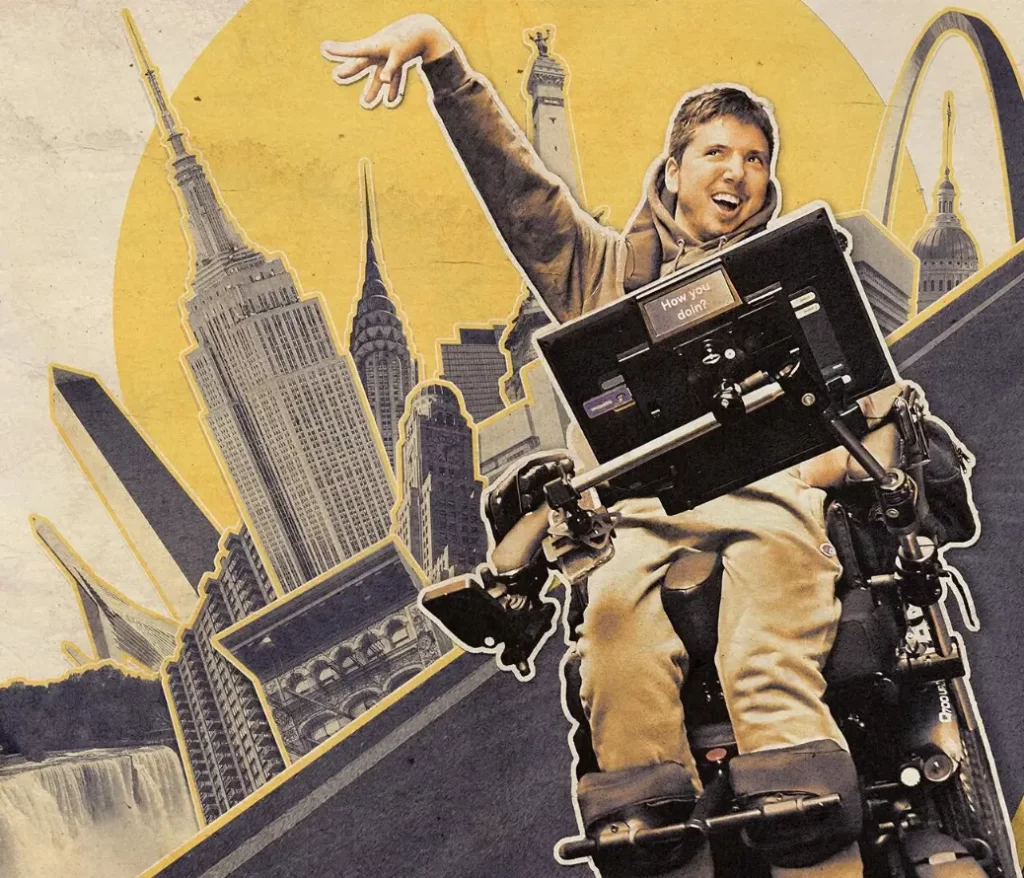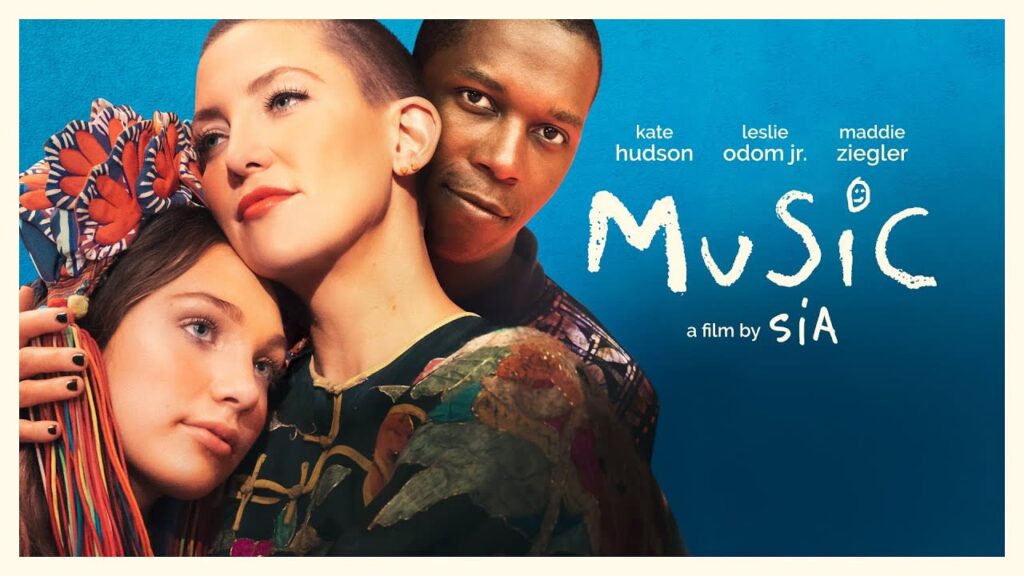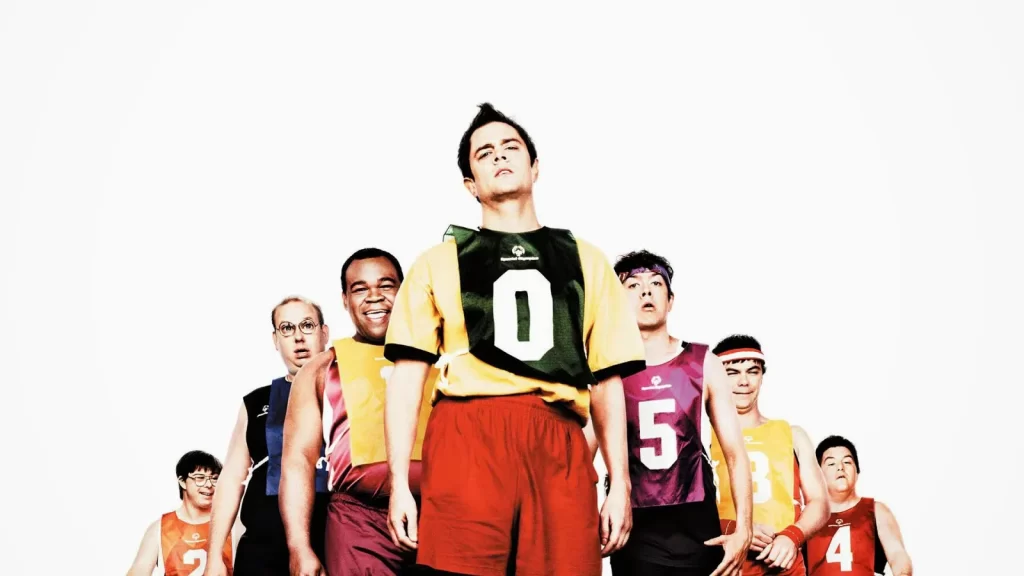Happy Black History Month!
We are back with special guest Thomas Reid of “Reid My Mind Radio”, as we discuss the legendary jazz musician Ray Charles, played by Jamie Foxx.
Transcript
Intro
AJ: Hey, guys, from all of us here at Acting Up With AJ and Crew, Happy Black History Month!
When I think about Black history, I think about paying respect. I think about paying homage to
the past and the ancestors that came before us with their wisdom. I also think about how history
is a live thing. It’s an ever-evolving thing. I also think about some of the challenges that are
ahead of us upon the horizon, good or bad. You’re listening to Acting Up With AJ and Crew.
[electronica theme music with recorded film clips and conversation interspersed]
[recorded clip from Ray] RAY: Yeah, yeah. I’m gonna make it do what it do, baby. Yeah.
THOMAS: You know, it’s not that often that a disabled person in a film is going to be seen in a
sexual way.
RAY: Oh, Margie, right?
MARGIE: Yeah.
RAY: But, look, Margie. From now on, you guys are gonna be called the Raelettes.
SHAWNSY: Even though disability is in one aspect, you can still be an amazing artist in the
same degree as anybody else.
THOMAS: You’re saying I can’t stand up for myself! Like, do [laughs], do they say that? Like, is
that a thing?!
RAY: I might be blind, but I ain’t stupid.
AJ: There’s so much of a correlation between blindness and musicianship, specifically with
Black musicians.
THOMAS: This movie makes it a little difficult, the conversation about representation. [hearty
laugh]
WOMAN: Mama’s got some more blackberry cobbler for you, baby.
MARGIE: Ray!
RAY: My God, do you have an idea how it feels to go blind and still be afraid of the dark? And
you sit there and pray just for a little light, and you don’t get nothing!
AJ: Don’t you know I’m all alone in all these shapes and colors? [electronica fades out]
[Ray Charles’ music plays in the background]
Learning about Ray Charles
AJ: Okay, we are back, and we’re gonna discuss movie number two, Ray, guys. Before we get
into the discussion—and I can’t wait to get into the discussion—let’s get into the summary of
Ray. The movie Ray is about the legendary soul musician. Ray was portrayed by the award-
winning— This is an award-winning film. Jamie Foxx won the Oscar, by the way. Ray loses his
brother at seven years old. He loses his sight at the age of nine, and his mom encourages him
not to feel sorry for himself. He rises through the musical ranks in Seattle, and he also
encounters a lot of trials, tribulations, struggles with drugs. But in the midst of all of that, he
becomes one of the hugest pioneers ever. So, let’s get into it, guys. We’re talking about the film
Ray. [music fades]
SHAWNSY: Yeah, I wonder if we start first on how Ray lost his sight ‘cause I’m kind of still
curious on the actual reason for his eyesight getting lost. I know he had that ointment that he
kept getting. I’ve seen rumors of it just being a bottle of Coke that caused it.
AJ: Was it hay fever or? I was thinking that it was hay fever because he was using some sort of
salve, and I know that—
SHAWNSY: It looks like it might’ve been juvenile glaucoma.
THOMAS: Mm.
SHAWNSY: Like, so when he was real young, got triggered with glaucoma and slowly lost it. So,
he practically was dealing with blindness his whole life.
THOMAS: Yeah, he was a young guy. He was a young guy. Yeah, juvenile glaucoma, huh? Mm.
I know that’s pressure.
AJ: So, for those of you out there that are ‘90s kids or ‘80s babies, you would remember. I came
in contact with Ray because of the, you know, I first remember seeing him and knowing him all
the time because of the Diet Pepsi commercials. “You got the right one, baby. Uh-huh!”
SHAWNSY: [laughs] I think I’m gonna have to look up that one.
[old Diet Pepsi commercial plays with Blues piano music]
RAY CHARLES: ♪ You know when it’s right. You know when you feel it, baby. You hold it, you
hear it, you taste it. It’s right. ♪ [music gathers energy]
BACKUP SINGERS: ♪ Diet Pepsi, uh-huh, uh-huh. ♪
RAY CHARLES: ♪ You got the right one, baby. Yeah. ♪
BACKUP SINGERS: ♪ Uh-huh, uh-huh. Diet Pepsi. ♪
RAY CHARLES: ♪ If it’s this irresistibly simple, uncontestedly taste-able, and intimately
wonderful, you got the right one, baby. ♪
BACKUP SINGERS: ♪ Uh-huh. ♪ [commercial fades]
THOMAS: That’s how you first came in to know Ray Charles?
AJ: Well, of course you know his music, but I remember seeing him more, of course, you know,
growing up, everybody knows Hit the Road, Jack and the song from The Cosby Show, Night
Time Is the Right Time. But I remember seeing him, the Pepsi commercials.
THOMAS: Yeah, yeah, yeah. That’s cool.
SHAWNSY: Yeah, I know my dad had I’m All Yours, Baby, on vinyl. And I didn’t listen to it any
more than any of the other records, but my dad was always listening to vinyls over and over.
And that was my first encounter with Ray.
THOMAS: Yeah, we had a bunch of vinyls, my mother and my father. My mother, she used to
refer to Ray Charles. She liked Ray Charles. She would, “Ray Charlie.” She called him Ray
Charlie. Ray Charlie, right? [laughs] So, I don’t know why. I don’t know who gave her that right.
But, [laughs] but I ended up buying tickets for them in 19… [clicks tongue, sighs] I don’t
remember, maybe ‘94 or something like that, maybe ‘95. Ray Charles was in concert at Radio
City, and I bought her and my father tickets. And my father was ill, and then he was really going
through something the day of the concert. So, my girlfriend at the time—no, no, she was my
wife—my wife and I at the time, so we went. We ended up going. So, I saw him in concert in the
‘90s actually.
AJ: And now I don’t know if this is true, but I was told by my great grandmother, my great
grandmother Emma, that Ray Charles is a distant cousin of mine.
THOMAS: Ah!
AJ: And so, he’s blind, and I’m partially blind.
SHAWNSY: [laughs]
AJ: Maybe it was some genetics in there. I do some singing, too. I don’t play, but….
THOMAS: And you like Pepsi.
THOMAS and SHAWNSY: [laugh]
Casting Jamie Foxx and representation
AJ: Yeah, I like Pepsi, you know. But I love this film. I was so excited to see the film. And I
remember, I remember when it was announced that Jamie Fox was gonna play the role, my
mom was like—we love Jamie Foxx—but my mom was like, I don’t know. Because we were so
used to Jamie Foxx being funny. Jamie Foxx Show, In Living Color. And so, we weren’t that
sure, but Jamie Foxx stepped up to the plate. What do you think, Thomas?
THOMAS: Yeah, absolutely. I think, you know, it’s funny because I think this movie makes it a
little difficult, the conversation about representation, right? [laughs]
SHAWNSY: ‘Cause I’m like, Jamie—
THOMAS: Jamie did a good job.
SHAWNSY: Yeah. On the fact that Ray Charles specifically signed off for Jamie Foxx.
THOMAS: Yeah, yeah.
AJ: And he embodied Ray.
THOMAS: Yeah. And again, they have to have, I mean, you know, the—not they have to—but
the idea that Jamie Foxx, and Jamie, he was hot at that time. You know what I’m saying. I mean
he’s still pretty popular, obviously. But that has to be a factor, I guess, you know. So, for Ray
Charles, who would want folks to really come out. But then I’m sure he was just vibing with
Jamie, and Jamie could really play. He’s a musician, and he was able to kind of do his voice.
The way he did that was really, it was really well done. So it’s hard to shoot that one down.
AJ: Yeah, speaking to that point, Thomas, I saw an interview of some special features. And to
that point, Jamie Foxx was kind of saying that Ray Charles is a straight shooter, and he was just
like. And they were sitting down at the piano. Ray wanted him to play, and they started playing
some Blues, and they were just. And Jamie Foxx was just following Ray, and Ray was like, “You
got it, boy.”
[recorded clip of Jamie Foxx, Ray Charles, and Director Taylor Hackford]
JAMIE: You were just messing with me. [laughs, plays fast chords on piano]
RAY CHARLES: Can you do that, Jamie?
TAYLOR: Well, Ray, is not easy, as I’ve said over and over again. He’s a musician, and he
knows what he’s doing. You.
[fast chords, then slower chords in a jaunty tune]
RAY CHARLES: [singing down the scale] Now, bam bam bam bam. [piano falls]
TAYLOR: And then Ray gets tougher. Come on, man, it’s right under your fingers. Come on,
man!
RAY CHARLES: Just eight. Just eight bars, you know. [singing and playing continue in tandem]
TAYLOR: And I’m thinking, oh, this could really blow up in my face, you know? But Jamie,
instead of wilting, saying, “Oh, I had enough of this, I’m not gonna be walking out,” he just kept
working it, working it, working it, and he got it.
RAY CHARLES: Yes! I think the boy got it!
ALL: [laugh]
Speaker8: Ah. Ha ha ha ha.
RAY CHARLES: Yeah, he got it.
TAYLOR: And you can see Jamie just kind of glow. He won the role right there from Ray
Charles. [more singing, playing, laughing]
RAY CHARLES: You can’t do that around me, man.
JAMIE: Hey, man.
RAY CHARLES: I get excited. I’m sorry. [recorded clip ends]
AJ: So, he kind of christened Jamie Foxx to take the role, and I think that he embodied, I think
that he embodied Ray. The only point in the movie where I didn’t see Ray, I saw Jamie Foxx,
was when towards the end, where he sees a vision of his mom, and so he’s not blind. I was like,
this is the only point in the movie where he looks like Jamie Foxx.
THOMAS: Mm. Okay. Yeah.
SHAWNSY: Yeah. But when you think about it, with casting, doing authentic casting, of course,
in a biopic, trying to emulate a very specific person rather than compared to Scent of a Woman,
which was very generic, just being a lieutenant colonel in the Army who was blind. That was the
description. This is Ray Charles, like the Ray Charles, and if it doesn’t look exactly like Ray
Charles, your whole movie is ruined.
AJ: Or at least embody and kind of the spirit and the sound. Jamie Foxx had the sound down.
SHAWNSY: Yeah.
THOMAS: Yeah.
AJ: There was even a part in the movie where you could tell he was playing the piano. And I
don’t know if it’s true or not, but I don’t think, it didn’t sound like Jamie Foxx was lip syncing, but
he sounded like Ray. And I was like, this is awesome, so.
THOMAS: There were some parts where I was like, oh, no, that’s definitely Ray Charles, like the
song played. So, maybe, I don’t, I don’t think that he was, you know, I think it was just some of
those extra scenes when they’re kind of going from one to the other, and they’re playing his
music, that was the original music. But, you know, come on, Jamie killed it. Jamie killed it. He
did. He did a fantastic job.
[recorded clip plays, a fast Ray Charles tune]
Newsfeed
AJ: Let’s go to newsfeed. We have a special report today. Here’s our field correspondent, Maso.
Maso, what’s going on?
RAY CHARLES: ♪ They doing the mess around, Everybody doing the mess around. ♪ [song
fades]
[bustling New York City street scene with passing cars and chatting people throughout the
newsfeed story]
MASO: [Thomas using a fabulous Nuyorican accent] This is your man on the street, Maso.
Bringing you the local. Maso is outside. That’s me and my white cane hitting the streets to find
the important information that you need to know. I’m happy to report that Senator Markey from
Massachusetts and Congresswoman Eshoo [gesundheit] from California introduced the
Communications, Video, and Technology Accessibility Act of 2023. This is the follow-up to the
CVAA, or the 21st Century Telecommunications Video Accessibility Act, signed into law back in
2010 by my man, President Barack Obama. This new bill is proposed to ensure that people with
disabilities have full access to mainstream communication, video programming, and emerging
technologies to participate equally in professional, educational, and recreational civic contexts.
Okay, you understand what that mean? Now you have a question right now. You say to yourself
how the [dog bark-bleep] they’re gonna do that?
Well, by requiring closed captioning for online video programming that mirrors current televised
video programming requirements, requiring audio description for both televised and online video
programming. Both of these, with limited exemptions for the people who make it themselves,
user-generated content. The bill directs the FCC to regularly update its quality standards for
closed captions and audio description. That’s good. It says video devices like televisions and
computers need to include features that allow easy activation and customization of closed
captioning and audio description preferences, and it must have compatibility with assistive
technology like Braille, voice control, and sip and puff technology. And mira. Sip and puff, it’s not
the same as sip and paint. Okay? It’s different. The bill goes on to improve access to ASL, video
conferencing accessibility, and expanding access to DeafBlind assistive technology. And it
empowers the FCC to ensure that its accessibility regulations keep pace with emerging
technologies like AI and virtual reality. Call your representatives and your senators and ask
them to sign on to support this important effort. Whether it’s about work or play, staying engaged
in your community, technology is a must. Let’s make sure we all can participate, okay? I’m also
bringing you the information you need, baby. Back to you, Papi. [street scene fades out into Ray
Charles’ music]
AJ: Thanks, Maso. Let’s get back to more Ray. You’re listening to Acting Up With AJ and Crew.
RAY CHARLES: ♪ … with the one you love now…. ♪ [music fades]
Ray Charles’s relationships in real life shown in the film
SHAWNSY: Well, let’s talk about some of the interactions that Ray kind of had, especially during
his career. Some of the manipulations that people were making of him, through him, either
financially and sexually with the female at the very beginning, the club owner that was clearly
taking advantage of him and of his blindness and thinking, immediately thinking lesser of him.
[recorded clip from the film]
MARLENE: Ray! [door slams] What did I tell you about cooking in the dark?! Are you trying to
burn the house down?
RAY: Think about it, Marlene. What do I need the light for?
MARLENE: Well, you don’t need to be cooking anyway. We brought you takeout from Oscar’s.
RAY: Well, get your money back. Fried chicken right here. Come on, sit down. Try this.
QUINCY JONES: Yeah. About time.
RAY: Yeah, that’s home cooked right there.
QUINCY: Mm!
MARLENE: No, thank you.
QUINCY: Just need a little hot sauce. It’s perfect.
RAY: Yeah. So, what’d Jack Lauderdale have to say?
MARLENE: Well, I clocked him coming out the gate. The man was a two-bit hustler.
RAY: Oh, I see yeah.
MARLENE: Yeah, it turns out that the only hit that Swing Time ever had was Open the Door,
Richard, which was a joke record.
RAY: What about him recording me?
MARLENE: Oh, he’ll record you if we pay the freight.
RAY: Scratch a lie, find a thief.
MARLENE: [scoffs] What’s that supposed to mean?
RAY: This. You see, I saw Jack Lauderdale tonight, and he gave me $500 advance on my
record. He also said he’d put me on the road with Lola Folsom and pay me three times as much
as you’ve been paying.
MARLENE: No, that’s a lie!
QUINCY: Ain’t no way he gon put some blind man on the road. Think about it. I mean, you need
watching out for, and he ain’t got the time to look after you the way I’ve been looking after you.
RAY: Is that what you been doing? Watching out for me? Is that why you get paid double what I
do?
QUINCY: Who told you that?
RAY: But it’s true, ain’t it? You and Marlene have been gaming me since I got here.
MARLENE: Ray, baby, listen.
RAY: Got to listen to you!
QUINCY: Look, Ray, I’ve been meaning to talk to you about that.
RAY: Then why aren’t you talking?
QUINCY: Um…. Look, Ray, Ray, let’s not do nothing stupid.
RAY: I might be blind, but I ain’t stupid! You, get my bag from upstairs.
MARLENE: What?
RAY: Get it!
MARLENE: Right now?
RAY: Now!
QUINCY: Ray, man, we done been through a whole lot.
MARLENE: Ray? Ray, now, wait a minute. I can explain everything now.
QUINCY: Look. Think about what you’re doing!
MARLENE: Ray, wait. Now, you making a big mistake. That clown is spouting promises that he
can’t keep! He’ll make a fool of all of you!
QUINCY: Hey, look, Ray! Ray, we’ll make a new deal! Whatever make you happy! You can lay
the pipe now. [clip fades]
AJ: Well, in one way, for being blind, but in another way, she had confidence in him in one way,
because she wanted him to lay the pipe. So, you know, so. [chuckles]
THOMAS: Yes, indeed.
AJ: She was liking something.
THOMAS: Yeah. I kind of, I mean, I know this was his, I don’t know if that was a true piece of
the story or whatever. But I was digging that part because, [laughs] just because it’s not that
often that a disabled person in a film is going to be seen in a sexual way. And so, for this, for
this man, this Black man, Black blind man, to be seen in a sexual way, I was like, all right. All
right. [laughs] Like, I’m not mad. I’m not mad! Maybe that makes me wrong. I don’t know, but,
you know.
SHAWNSY: Well, it is one of those kind of things that it’s not a very, it’s not a visible disability.
Like, yes, there’s sometimes cloudiness of the eyes in blindness.
THOMAS: Mmhmm.
SHAWNSY: But still, they are very similar to any other human.
THOMAS: Yeah.
SHAWNSY: So, it is a disability, but sexually, Ray Charles is still a sexy man.
THOMAS: Yeah, which was cool because I can tell you that as someone who became blind as
an adult, I know there were folks in my life who questioned whether or not my wife and I would
still be having sex. Like, really? [laughs]
SHAWNSY: Yeah. Your blindness is affecting your erectile dysfunction? [chuckles]
THOMAS: Yeah, yeah. Or like, I don’t know where it goes no more? Like, what’s?
ALL: [laugh]
THOMAS: I don’t understand that, so.
SHAWNSY: ‘Cause you only have sex with the lights on.
THOMAS: Yeah.
SHAWNSY: [laughing] Nobody has sex in the dark.
THOMAS: Yeah. Yeah. So, people have these ideas and these thoughts behind what it means
to be blind and what it means to be disabled in general. And so, it’s like, yeah. So, I was kind of
cool with that one. I was cool with that. That and, not that I’m cool with his multiple relationships
and infidelities or anything like that. But, you know, the fact that they were able to show Ray as
a sexual being I thought was cool.
AJ: Yeah, ‘cause he was a womanizer. Yeah, he was definitely a womanizer. And but it’s kind of
like he was a woman— And I’m not justifying it. And this doesn’t really have to do with disability,
but I always find it, I always find the part fascinating in the movie where it was like he was a
womanizer, but only on the road. He was like, I’m not leaving my wife, you know?
SHAWNSY: Right. It’s like he was in it for the label. Like, he was refusing to give up the label of
being a husband and having a wife but will still cheat on her all the time and father multiple
children with other women.
AJ: Or it’s like I think maybe it has something to do because even his wife being in the movie,
she said, you know, “I know you’re a musician, a working musician.” I took that to mean maybe
it’s known and it’s okay. Like, maybe the pressures of the road are so great, or the fact that
there’s so much temptation on the road.
THOMAS: Yeah.
AJ: And that there’s so much around and so much opportunity that even his wife didn’t like,
okay, you do that on the road, but when you’re here, we’re family.
THOMAS: Yeah. It was thrown at him. It really was thrown at him. And I mean, if we wanna get
all into his thing, I mean, he didn’t have any sort of example, right? He didn’t have a father.
SHAWNSY: Right, right.
THOMAS: He lost his mother really early. So he had no example of except for what he was
probably seeing on the road and all the people in terms of his life. So, I think that’s a factor.
AJ: ‘Cause he went on the road as a young man, and I think that even had a lot to do with, you
know, trying to cope on the road because he got into doing cocaine. He was influenced as a
young man. And the movie kind of alludes to it, I don’t know, maybe trying to cope with certain
things because he felt guilty for the death of his brother.
THOMAS: Yeah, I don’t think it was cocaine. I think it was heroin that he was on.
AJ: Oh, yeah, yeah. Yeah, heroin.
THOMAS: Yeah.
AJ: Back in the day, what’d they say, “smack?”
THOMAS: Smack, yeah.
SHAWNSY: Yeah. So much of this movie wasn’t about his blindness at all. It was all, he had so
many other issues that he was dealing with, which—
THOMAS: Yeah, he had trauma.
SHAWNSY: He was a complicated man.
THOMAS: Yeah, yeah. I mean, losing, that’s rough. Like, watching your brother die, you know.
And he froze, right? If I remember correctly, I think he froze during that whole thing.
AJ: Although, Thomas, this makes me think about this point because, to the dark thing in Scent
of a Woman, Ray does, he does have a conversation with Bea, and it’s very emotional. And he
says something to the effect, “Bea, don’t you know, don’t you know I’m alone in the dark?” So, in
that case, were you snickering, or were you like, come on again with the dark? Or did that have
more of an emotional impact?
THOMAS: Yeah. Absolutely, absolutely. I was like, ugh, here we go. Yeah, I’m gonna say that all
the time. [laughs] ‘Cause I don’t know if he said it. And even if he did say it, I mean, I feel like it’s
still a, you know, I mean, [sad voice] yeah, whatever.
SHAWNSY: Well, it’s pretty much the describing what people are seeing on screen of just like,
say, if you wanna define somebody being a blind man, they gotta say, “I’m alone in the dark.”
[chuckles]
THOMAS: Yeah. And what’s funny is that most, I mean, if we’re gonna get technical, most blind
people, it’s not, that’s not what it is. They don’t see nothing. They don’t just see darkness. Like,
that’s not the case.
SHAWNSY: Yeah, you still got pupils. Like, there’s still light getting through your eye.
THOMAS: Some people. Some people, there’s light. Some people, even when you don’t see
anything, like myself, you see, [sighs] I see random shapes and colors. I did a whole episode
about what I call my hallucinations. And so, and there’s lots of other people who, similar type of
thing. But yeah, folks have light perception. Some folks see cloudy. Some folks, they just see
nothing, but it might be white. It might not even be, it might be more of a cloudy white-looking
thing. So, there’s lots of different things, but it’s not just in the dark. So, that just comes from
someone, it’s that assumption, right? So there’s no real authenticity when you talk about that.
AJ: Well, I guess, so maybe some of the other scenes should be, “Don’t you know, I’m all alone
and all these shapes and colors?!”
THOMAS: [guffaws]
AJ: “All this whiteness!”
SHAWNSY: If you wanna be real about it.
THOMAS: Well, why do you even need to say “in the dark” or whatever? You know, they know
you blind, but you just don’t, whatever.
AJ: [laughs]
SHAWNSY: Right. Well, it’s like any time that Hollywood is writing their generic scripts, that
they’re always going to do it the way that the mass audience has been told it for decades.
THOMAS: Exactly, exactly.
AJ: It’s almost like they say, just in case you don’t understand audience, blind.
SHAWNSY and AJ: [laugh]
THOMAS: But do they do that with anything else? I don’t know. I don’t know. Like, do you, if
someone is a wheelchair user, does it say, you know, do they ever say, “You see? I can’t stand
up for myself!”
ALL: [side-splitting laughs]
THOMAS: Like, is that a thing?
AJ: I know! I can’t think of anything specific right now, but I’ve seen, like, “Don’t you know I’m in
this chair, damn it?!” Yeah. And I’m like, oh, that does kind of like, come on! Especially, you
know, I’m not saying that it doesn’t ever happen. I’m pretty sure there’s people out there that do
have their frustrations.
THOMAS: Yeah.
AJ: I don’t wanna erase it. There is frustrations. But a lot of times when we see these
frustrations, it’s people that have been in this experience for a while. And like, just with a lot of
the movies, it’s always alluded to, like in the case of Theory of Everything, even though Stephen
Hawking was in a chair, he had ALS. But in the movie, the last scene, they showed him walking,
you know. And there’s always sort of that thing is like even though you have, you’re in this chair,
you still think about walking.
THOMAS: Yeah, like that’s your ultimate goal.
AJ: I’m not saying I never think about it.
THOMAS: Yeah.
AJ: But that’s not, like, I’m not mainly occupied with that. Why? Because I’m not saying I never
was. But the reason why I’m not mainly occupied with that is because I’ve been at the
wheelchair thing for a while. I’m 40 years old, so I pretty much know this is how I’m gonna be
rolling, you know?
THOMAS: [chuckles]
AJ: I don’t need to think about walking. The main thing I think about is how the world is
unaccessible, but that’s another discussion for another time, but.
THOMAS: Yeah, and it’s not to take away because that’s the thing. It’s not to take away from the
fact that adjusting to blind—so, and again, this is more so for the Scent of a Woman than it is for
Ray—but adjusting to blindness is hard. Like, there’s things. If you were sighted and you were
living your life in a certain way, and then now you have accommodations, you have to,
adaptations you have to make to do certain things or whatever the case may be, yeah. It’s hard.
SHAWNSY: Well, it did show those frustrations of him growing up and not being able to see his
mother and crying out for her, and she not responding.
THOMAS: Yeah. Yeah, that was rough man. That was rough.
SHAWNSY: Like, man, for a child dealing with that.
THOMAS: Yeah, that was rough. And then we learned that he went off to school, and she
passed away. So now he’s by himself. That was it. So there’s a lot of stuff in there that he was
dealing with on his own or never really got to deal with, right? So, all that mental trauma, he
never had any sort of—
SHAWNSY: Yeah, that made me think of it too, when his bandmates left him in the bar when he
was on the end of one of those skits of him just sitting by himself in a closed-down bar and
being in a foreign city. He wasn’t at home. He wasn’t close to home. And then like, and that
feeling of loneliness, of just being like, where the hell even am I? Like, it’s a huge world out
there.
THOMAS: But that wasn’t new for him, right? That’s what it felt like. Oh, okay. Y’all going? This
ain’t new. He’s been there. He’s been there.
AJ: You know how they left him. But if you notice much time later in the film, he employs all of
them. They were homies for life, but it’s like they weren’t there for him in the beginning. But, you
know, which it just shows how you need to be, you know, you need to grow and get to know
people. And sometimes in early journeys, people can make mistakes. Nobody’s perfect. Ray
was hooking everybody up, though, making it do what it do.
SHAWNSY: He was hooking up.
THOMAS: [chuckles]
AJ: Yeah, he was hooking up and owning those masters, and you know. And traveling the world
and doing all kinds of stuff. And he was such a trendsetter, too. I’ll never forget one of the things
that he says that I love is like, I saw him in an interview, and he was just like, I don’t get into
genres. People wanna put you in boxes. He’s like, I just look at music in two ways. There’s good
music and there’s bad music. And he loved all kind of music. And I was like, that is really dope,
you know? ‘Cause I can identify with that. I just love music. [upbeat Ray Charles tune plays]
RAY CHARLES: ♪ Well, I got a woman way over town that’s good to me. Oh, yeah…! ♪
Content Roundup
AJ: Here’s Cheryl Green with your Content Roundup! Cheryl? [music fades into chill ambient
music]
CHERYL: Okay, I know we’re on season two of Love on the Spectrum on Netflix, but there’s this
review from 2020 of the first season that I really like, and I just thought it would be a cool one to
share. This is an article by Sara Luterman, and it was published August 18th, 2020 on the
website SpectrumNews.Org. These are the words of Sara Luterman.
“I’m autistic, and I got engaged in July. We don’t have any couples’ pictures — it’s hard to ask
someone else to snap a photo for you during a pandemic. But otherwise, it was perfect. My
partner and I spent the day hiking in the woods and wading in the Patapsco River in Maryland.
After, we sat on a bench to eat sandwiches I’d packed. He didn’t kneel. He just handed me a
small ring box and smiled like the sun.
Anecdotally, many parents worry about whether their autistic children will ever find love. I know
my parents did. Because autistic people can struggle with social and emotional communication,
we don’t form relationships as easily or in the same ways as our neurotypical peers. And that
can be a major source of anxiety for our families, and even more so for ourselves.
Some may find reassurance in watching Love on the Spectrum, a new reality dating show on
Netflix that follows several autistic and photogenic 20-somethings as they explore relationships
and dating, some for the first time. Unlike most reality television, the production crew isn’t trying
to stir up drama. No one gets voted off the island. No one is told to pack their anime figurines
and go. Although I was not completely pleased with “Love on the Spectrum,” it is kind, and I
respect the creators’ good intentions.
One issue I have with the show is how unrealistic it is. Olivia, a fiery-haired woman who loves
Harry Potter and her theater company, claims at one point that only 5 percent of autistic people
ever find love. The production crew doesn’t contradict her, and her statement is framed as fact.
But it isn’t clear how many autistic adults find successful, lasting relationships, let alone how
many date or, heaven forfend, have hookups or one-night stands. The data are scarce. Where
did Olivia’s number come from?
The factoid probably came from a 2018 study of mid-life social outcomes, which found that 5
percent of the autistic participants had been married at least once. But that’s a far cry from
stating that only 5 percent of autistic people ever find love. Also, even those marriage results
may be skewed: The age range for the study, from 22 to 51 years old, was quite broad, and it
would be unusual for a 22-year-old to have ever been married, whether the person is autistic or
not. The results do not reflect how successful autistic people are at large in the dating world.
The show is also riddled with bad advice and is frequently infantilizing. There are more
interviews with parents than with the people the show is ostensibly about. The musical cues
would be more appropriate for a documentary about clumsy baby giraffes than for a reality
series about adult humans. In one particularly galling moment, the production staff ask Sharnae
and Jimmy, an autistic couple who are moving in together, if they have “consummated their
relationship” — to which they sort of laugh and confirm that they have. They are a couple in their
20s. They are moving in together. They sleep in the same bed. For any readers in doubt, I can
assure you: Autistic people have sex, just like anybody else. Jimmy and Sharnae have had sex.
It was a bizarre question and supremely uncomfortable to watch.
The therapy and assistance offered to the young people featured on the show is similarly out of
touch. Jodi Rodgers, a relationship counselor, coaches several of the autistic people on the
show, and unsurprisingly, none of her clients have any success. Rather than teaching them how
to make any kind of emotional connection, she teaches a series of behaviors: Hold out a chair
for your date, make eye contact, don’t talk too much about what you love. Some of the autistic
adults also attend the PEERS program, which encourages loveless enrollees to point out each
other’s failures in order to adequately perform ‘neurotypicality.’ The therapists mean well — they
clearly see it as helping their clients put their best foot forward. But the behaviors they’re
encouraging aren’t natural or real. And they are especially odd on dates between two autistic
people. What is the point of having someone go through motions when the other person may
not even notice or care? Why instruct two autistic people to look at each other’s faces and
smile?
The successful dates and relationships on the show — Chloe and Lotus, Thomas and Ruth,
Jimmy and Sharnae — embrace each other’s autism. In one particularly heartwarming moment,
Jimmy, nervous about a big surprise he has planned for Sharnae, insists that he needs to go to
a store to get navy blue socks. He becomes increasingly agitated that his socks are black.
Sharnae doesn’t roll her eyes or tell him to behave better. She goes with him to the store. They
get the socks, and then they go on to have a lovely evening. It’s a moment of love and
acceptance that I am grateful to have experienced in my own relationship from time to time.
Another positive thing about Love on the Spectrum is the way it portrays queer relationships.
Chloe, a lovely autistic woman who is also deaf, dates both men and women over the course of
the series, and it is treated as utterly unremarkable. Chloe’s date with Lotus is one of the series’
highlights and has rightfully emerged as a fan favorite.
If anything, it’s strange that there isn’t more LGBTQ representation in the series. There is
emerging evidence that autistic people are significantly more likely than the general population
to be gay, bisexual, transgender or otherwise queer. Few of the autistic adults I know are
straight. It would have been nice to see that reflected in the show. Similarly, although the show
balances gender well — it features plenty of autistic women — it does not do so well on race.
Almost the entire cast is white. People of color face major diagnostic disparities, and Love on
the Spectrum does little to challenge the unbearable whiteness of TV autism.
Love on the Spectrum probably won’t educate anyone about autism, or even about the realities
of autistic dating. It isn’t science. But if you want to watch a dating show in which everyone is
treated with kindness, you might want to add it to your Netflix queue.”
And that’s the end of the article by Sara. Now, I’m not autistic. I identify as neurodivergent, but I
can tell you I couldn’t finish the first season, and I actually have no interest in watching the
second season. Not a big reality TV fan, for one. But I think the other thing is a few of the things
Sarah pointed out were just really hard for me too. The clumsy baby giraffe music, it just is so
childish. It’s not sexy, it’s not romantic, it just doesn’t feel adult. And even though the production
team, really, I agree with Sara, does seem really nice to the stars, I just hated how much airtime
some of the parents got. There was plenty of [sad pause] I guess it’s light-hearted, jocular
teasing, but I hate that kind of teasing. I literally don’t understand it, and I get very bent out of
shape when people try it with me. Watching some of the autistic people in the show be teased
by their own parents, I don’t know, that stuff is just not funny to me. And it made my stomach
hurt, and that’s part of why I couldn’t finish watching it.
Yeah…. I like content that’s more geared toward the disabled audience rather than, “Look, non-
disabled people! Disabled people are humans and adults too!” But then, if that is the message
you wanna put, why do you have the clumsy baby giraffe music in there? I’m not gonna say
don’t watch it, but I will say I don’t really like it. All right, well, thanks for having me on the show
to read this article and to share my voice of reason or voice of emotion thoughts with you today.
[music fades out and into more Ray Charles music]
AJ: Thank you, Cheryl, for that very honest article and critique. Here’s hoping that for Season
Two, the producers listened to that critique and others in the autism community. And I must say,
what’s up with the giraffe music? If you wanna check out Season Two of Love on the Spectrum,
it’s currently streaming on Netflix. Audio description and closed captioning are available. [music
fades]
Disability as one aspect of a person
SHAWNSY: It was also a great movie of just showing that even though disability is in one
aspect, you can still be an amazing artist in the same degree as anybody else. It’s kind of like,
Thomas, like, you’re doing your podcast, and you’re still doing it. You’re crushing it, and you’re
not affected by your blindness. Like, and it’s not a disability in that field that you’re just as good
as anybody else. Ray is better than [chuckles] everybody in that field when he was in his prime
doing those records.
THOMAS: Yeah. I think…. And yes, I would agree. But at the same time, I think there are things
that still, that are real, that do affect us, right? So, if we’re talking about me and podcasting, you
know, there are issues around accessibility. I’m only able to “compete,” quote-unquote, ‘cause
I’m not competing, and to produce because things are accessible. I think about musicians like
Ray who, during that time, if he were around, if he was starting out today, and so much of it is,
you know, the music industry is so different, and so much of it is about independence. And
without things being accessible, he wouldn’t be able to produce his music and to put that out.
So, he had record companies behind him. He had money being put behind him, so he was able
to assemble musicians and recording studios. And so, he didn’t necessarily have to do any of
that stuff himself in terms of the actual technical side, right, recording. But accessibility comes
into play. And so, we can’t discount that ‘cause that’s real. Accessibility, so. Yeah, I think about
that. I think about that around him. Especially when you get into production of audio, a lot of
stuff is still inaccessible. And I think about him. I think about Stevie, who has access to an
engineer. So he may not necessarily have to record his own stuff, where you got other
musicians trying to do their thing independently because they don’t have money, right? And so,
maybe they can’t afford to go to a studio and get it done.
SHAWNSY: You’re right. It’s like a different path, especially in the beginning, it’s a different path
that you have to kind of go to get to the same end point.
THOMAS: Yeah. Right. Like, back then he was doing, you know, when he wasn’t, he’s doing
covers basically, right? So he was doing the Nat King Cole stuff and everyone else. That was a
whole idea that he didn’t find his voice, but yet he was able to be discovered because of that
and make a living because of that. That’s a lot different than it is from today, you know? Today’s
musicians are doing stuff and putting it on SoundCloud or whatever the case may be, you know,
to try to get quote-unquote “discovered” or to put their own things out.
AJ: Now, before we wrap it up, I really wanted to talk about a discussion that we got into earlier.
And, Thomas, you said you had some thoughts, and I definitely wanna hear them. I often think
about, and over the years I noticed, there’s so much of a correlation between blindness and
musicianship, specifically with Black musicians. I often think of this correlation. I know, Thomas,
you said you had some thoughts, and I definitely wanna hear them because I’ve noticed this a
lot over the years.
THOMAS: Yeah. I feel like part of this happens because of what people’s perceptions are, right?
So you lose—again, like we talked about—you lose your sight, and your other senses are
heightened. That’s the belief. You lose your sight and so, oh—
SHAWNSY: Right. Scent of a Woman talking about his nose.
THOMAS: Yeah, yeah. And so, this idea, I feel like, is, I don’t know where it started, but I feel
like it’s just one of those things that just continued over the years where someone becomes
blind. Okay, well, then you’re probably, you know, you’re gonna use your ears more, so you
probably could be a musician. And so, I think it’s highly taught in schools. They have access to
music and learning music and stuff like that in blind schools. I almost look at it though, too,
‘cause you were specific about it being Black blind musicians, and I’m sure there are ‘cause I
know a lot of folks, yeah, who are not Black and are into music. And I’m sure some of those
same schools or whatever kind of persisted and did that whole thing as well. But I almost feel
like it’s like [pause, big sigh] there’s a similarity to when someone thinks that this is “your way
out,” quote-unquote. So that could be like, you know, in communities sometimes it’s basketball,
it’s football, it’s rap, right?
SHAWNSY: Yeah.
THOMAS: So they think those are the three options. I could play some sports, I could rap, or I
can go over here, and I could do this, I could do these bad things, you know. So these are my
only options. And I feel like sometimes it’s looked like that too when it comes to blindness, like
your options are be a musician or well, don’t do anything. Just, you know.
AJ: [chuckles]
SHAWNSY: Yeah. Well, even for a lot of disabilities and special education in schools, pretty
much pigeonholing people into specific corridors and being like, you know, we’re just gonna take
care of you and not give you these opportunities or not even think about what opportunities you
could do.
AJ: Work shelters and….
THOMAS: Yeah, yeah. And so, and even Ray talked about some of that in the film. He was like,
you know, all my other friends are making wicker baskets and stuff. And that was basket
weaving. Like, that’s a “trade,” quote-unquote, that they would give blind people. Piano tuning,
that was a historical trade that they would give. So, you know, you probably still got a lot of
piano tuners who are blind because they could hear well. They have perfect pitch.
SHAWNSY: [chuckles]
THOMAS: Now, there could be some people, there are some people who just have perfect
pitch, and maybe it is, yes, because they’re using their ears more. But it’s also because they got
into that probably early and been trained in that. So I always feel like, oh, you know, somebody
could be trained in anything. I think we miss, well, part of it, too, again, goes back to
accessibility. But at one point there were a lot of computer programmers who were blind. The
early mainframe days, when it was basically all text-based before the graphical interfaces, you
had a lot of blind folks—
SHAWNSY: Yeah, when it was all punch cards.
THOMAS: —yeah, who were doing that type of work.
AJ: Well, there’s a lot that we can get into, brother. We’re not getting into all of it today. I feel like
you—
THOMAS: But before you— I do wanna announce that my album is coming out [laughing]
because I did start taking up music.
ALL: [laugh]
AJ: Yeah, yeah! [keeps laughing]
SHAWNSY: Yeah, play me some of that gospel jazz.
THOMAS: Yeah. That’s it. Let me get over here to my piano. Let me. [laughs]
AJ: From the Sweetwater Creek. You know, but I feel like, and we’re not gonna do it. We’re
gonna have plenty of time to chop it up in more discussions. But I feel like we could just, I mean,
we could just talk all day. We’ve practically been doing it already. I feel like we could do like a
Questlove Supreme episode.
THOMAS: Oh, man, four hours. [chuckles]
AJ: Shoutout to Questlove. You know, if you wanna come on my podcast or Thomas’s podcasts
or both, you know. Shoutout to Questlove. Questlove is very into audio description.
THOMAS: Mmhmm.
AJ: But thanks so much, again, for coming on a second episode of Acting Up With AJ and Crew,
and we will do it again. All right. Well, thank you, brother.
THOMAS: Thank you, brother, for inviting me. I appreciate it and always look forward to it.
AJ: Thomas, where can the listening audience, anybody that wants to check you out, where can
they get your podcast?
THOMAS: Hmmm. Cool. Well, they can get the podcast, which is called Reid My Mind Radio,
wherever you get podcasts. I have transcripts and more. You can also go to ReidMyMind.com.
The way to get there, the way to find the podcast, the way to find the website is making sure you
spell the name Reid like my last name: R-E-I-D!
AJ: Yes, yes. Yes. Check him out! It’ll be well worth it. Lots of good, lots of great content. Good
episodes.
THOMAS: Thank you, sir.
AJ: All right. Love you, brother. Peace.
THOMAS: Love you too, bro.
AJ: All right. Thanks for joining us. Join us again for the next episode. Peace!
Ray is available for streaming on Amazon Prime Video. Closed captioning and audio description
are available. Now, for those of you that still have a home entertainment video system or DVD
player, audio description is available exclusively on Blu-ray/DVD only.
[mellow hip-hop]
You might celebrate Black History Month by listening to a little-known Black history fact on the
radio, or you might hear a special on the news or read a great biography or two. Or you may
know of some great leaders in the past, like Fannie Lou Hamer and Bayard Rustin. Or you
might know of some groups of people like the Freedom Riders or SNCC, Student Nonviolent
Coordinating Committee, and the Black Panthers. You may know of leaders like Angela Davis or
Fred Hampton, who was sadly slain down and killed and gone way too soon. If you wanna learn
more about Fred Hampton and the Black Panther Party, you should check out the film Judas
and the Black Messiah. It’s available on Max. Closed captioning and audio description are
available. But did you know that there was a disabled advocate and activist? His name is Brad
Lomax. And today, in Disability Spotlight, we salute and honor Mr. Lomax. Here’s Shawnsy
Billops with more. Shawnsy.
Disability Spotlight
SHAWNSY: Thanks, AJ. On today’s Disability Spotlight, we’re gonna go back in history to the
era of the Civil Rights and disability rights movements of the 1960s and ‘70s. This is a
summarization of a New York Times article from 2020 by Eileen J. Connolly.
Bradley Lomax, born September 13th, 1950, joined the Black Panther Party in the 1960s, and in
1969 helped found its Washington chapter. When he joined, he hoped to be part of a revolution
that would provide a better life for Black Americans free of inequality, poverty, and police
brutality.
At a young age, he was diagnosed with multiple sclerosis, and during his time in Oakland, found
the many difficulties of navigating the public transport system while using a wheelchair. Lomax
became a key figure in the disability rights movement when he joined more than 100 people in
1977, in occupying the 4 th -floor offices of the Department of Health, Education and Welfare in
the San Francisco Federal Building. Their goal was to persuade the government to enforce a
long-ignored section of the Rehabilitation Act of 1973. Tucked in the Act was section 504, which,
modeled on the Civil Rights Act of 1964, had the potential to change the lives of people living
with disabilities by prohibiting recipients of federal aid from discriminating against any otherwise
qualified individuals with a disability. The demonstration, known as the 504 sit-in, would last for
almost a month, making it the longest peaceful occupation of a federal building in the nation’s
history.
SHAWNSY: Lomax, accompanied by an attendant, Chuck Jackson, not only helped lead the
protest, he also gained the support of their fellow Black Panthers, a group that had advocated
armed self-defense while also providing social services to the Black community. The Panthers
agreed to bring hot meals and other provisions to the building daily. Corbett O’Toole, who took
part in the demonstration, wrote in an unpublished memoir, “Without the presence of Brad
Lomax and Chuck Jackson, the Black Panthers would not have fed the 504 participants.
Without that food, the sit-in would have collapsed.”
One of the demonstrators, Dennis Billups, said in a phone interview that many of the protesters
had no idea that the sit-in would last so long. Most had no toothbrushes, no change of clothing,
and no food. But even as the sit-ins in the other cities fizzled out, and even as the government
switched off the water supply, cut off telephone lines, and restricted movement in and out of the
federal building, the San Francisco contingent held strong. After Lomax sent word to the Black
Panthers that the protesters intended to stay put, the group mobilized, delivering ribs, fried
chicken, and a message of solidarity. Judy Heumann said, “Brad was able to get the Black
Panther Party to see that this was critical to the work that they were doing. He was the linchpin
for that.”
Though the sit-in received only sporadic coverage by the mainstream news media, the Black
Panthers newspaper followed it closely, with Lomax acting as the go-between for reporters.
After three weeks, Lomax and Jackson were among 25 demonstrators chosen to travel to
Washington to pressure Califano to sign the regulations. The trip was successful. Califano
signed the regulations on April 28th, 1977, and the contingent returned to San Francisco to lead
the demonstrators out of the federal building, singing We Have Overcome. Lomax continued to
work with the Panthers for a few more years, sadly passing away from complications from
multiple sclerosis in Sacramento on August 28th, 1984. He was only 33 years old. Phillips said,
“I don’t think that all of his aspirations were fulfilled even after the demonstration. He really
wanted more.”
While the 504 regulations pushed the government towards accessibility, they applied only to
federally funded programs. But their enactment laid the groundwork for the Americans with
Disabilities Act, which was passed in 1990. We thank Bradley Lomax for being an integral part
in the success of the 504 sit-in. The lives of everyone with a disability would be drastically
different today, 50 years later, without the help of him and his Black Panther Party. It saddens
my heart deeply to think about everything that this man could have accomplished with more
time. And we thank Bradley Lomax. [hip-hop fades]
Wrap-up
[epic news music]
AJ: Thanks for joining us today. We hope you enjoyed the show. We really enjoyed making it for
you and putting it together. So, for Shawnsy Billops, segment producer Cheryl Green, and
myself, Ajani AJ Murray, come and join the crew next time for another episode of the Acting Up
with AJ and Crew. Our next episode we’re gonna be talking about the movie Peanut Butter
Falcon. Special thanks to Jessica Marks for behind-the-scenes assistance.
Transcript by Cheryl Green.
